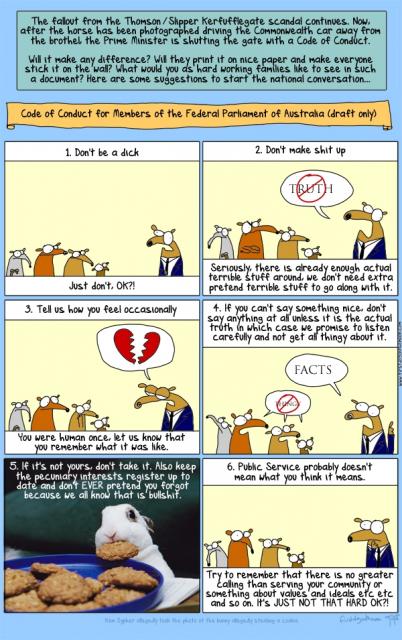Search
Democracy Links
Member's Off-site Blogs
the theatre of the absurd .....
from Crikey …..
Crikey Canberra correspondent Bernard Keane writes:
MINISTERIAL CODE OF CONDUCT, PARLIAMENTARY STANDARDS
When it comes to codes of conduct, the Commonwealth parliament badly lags several other jurisdictions.
New South Wales, Queensland, WA, Tasmania, Victoria, the Northern Territory and ACT parliaments all have codes for MPs (in Tasmania, for government MPs only), which are additional to, or include, ministerial codes of conduct -- which the current federal government has.
NSW goes one better than merely having a code of conduct: the NSW code is included in definitions relating to corrupt conduct under the Independent Commission Against Corruption Act, meaning a breach of the code has potentially serious consequences and an investigative apparatus to pursue it.
The Coalition view on a Commonwealth code of conduct -- that you don't need a code to tell you what's right and wrong -- is at odds with its own policies about other industries (it's OK to urge consumers to provide input to a communications industry code of conduct, but apparently a parliamentary one is out of the question) and the parliamentary reform agreement it signed up to in 2010, which committed the Coalition to support a code of conduct (backed by a parliamentary integrity commissioner), although it has repeatedly abrogated that agreement.
That position is also plainly wrong.
There are plenty of issues where a code is necessary to identify inappropriate behaviour. What about disclosure of secondary employment? At what point does an MP need to reveal that, like John Howard's industrial relations consultancies for law firms in the 1980s, they're receiving income from another source? The NSW code, for example, addresses that issue. What rules should apply to post-political employment? Ministers and advisers now face a cooling-off period. What about other MPs seeking to move into lobbying? How about more timely and comprehensive disclosure of pecuniary interests?
And then there's treatment of political and electoral staff. All too many MPs on all sides of politics apparently don't know what's right and wrong when it comes to how they treat their staff, and the result is a lengthy casualty list of broken people, often but not always with compensation from taxpayers, for being bullied, harassed and abused.
It's telling that none of the current state codes of conduct relate to treatment of staff, although the Victorian Parliament imposed a hardline code of conduct on staff.
The whole issue of a parliamentary code of conduct and appropriate enforcement mechanisms was meant to have been resolved long ago, as a consequence of the agreement to improve parliament. But the implementation has been marked by delay and lack of interest -- almost as if MPs would prefer there be no mechanism for assessing their ethical standards.
I usually treat Bernard Keane’s pieces seriously, although I found his argument in support of a code of conduct for federal politicians to be nothing short of hilarious.
I’m sad to say that Bernard’s thesis that such a code would miraculously lift parliamentary standards & enhance the integrity & honesty of our politicians & their enablers is simply naïve at best.
For other optimists & wishful thinkers out there, the proof of my assertion rests on the all too obvious fact that our elected leaders are simply incapable of agreeing to or supporting any idea, proposal, suggestion or initiative that is not their own, regardless of its merit, unless of course it involves adding to their own already outrageous levels of reward or somehow acts to enhance their vainglorious impressions of themselves; such as posing hand-on-heart at remembrance ceremonies or kissing babies.
In my view, it would never occur to a politician to act honestly, particularly when our political theatre rewards them so well for behaving in exactly the opposite fashion.
- By John Richardson at 14 May 2012 - 8:08pm
- John Richardson's blog
- Login or register to post comments

Recent comments
26 min 41 sec ago
3 hours 23 min ago
5 hours 41 min ago
15 hours 22 min ago
16 hours 10 min ago
23 hours 11 min ago
1 day 2 hours ago
1 day 4 hours ago
1 day 5 hours ago
1 day 5 hours ago